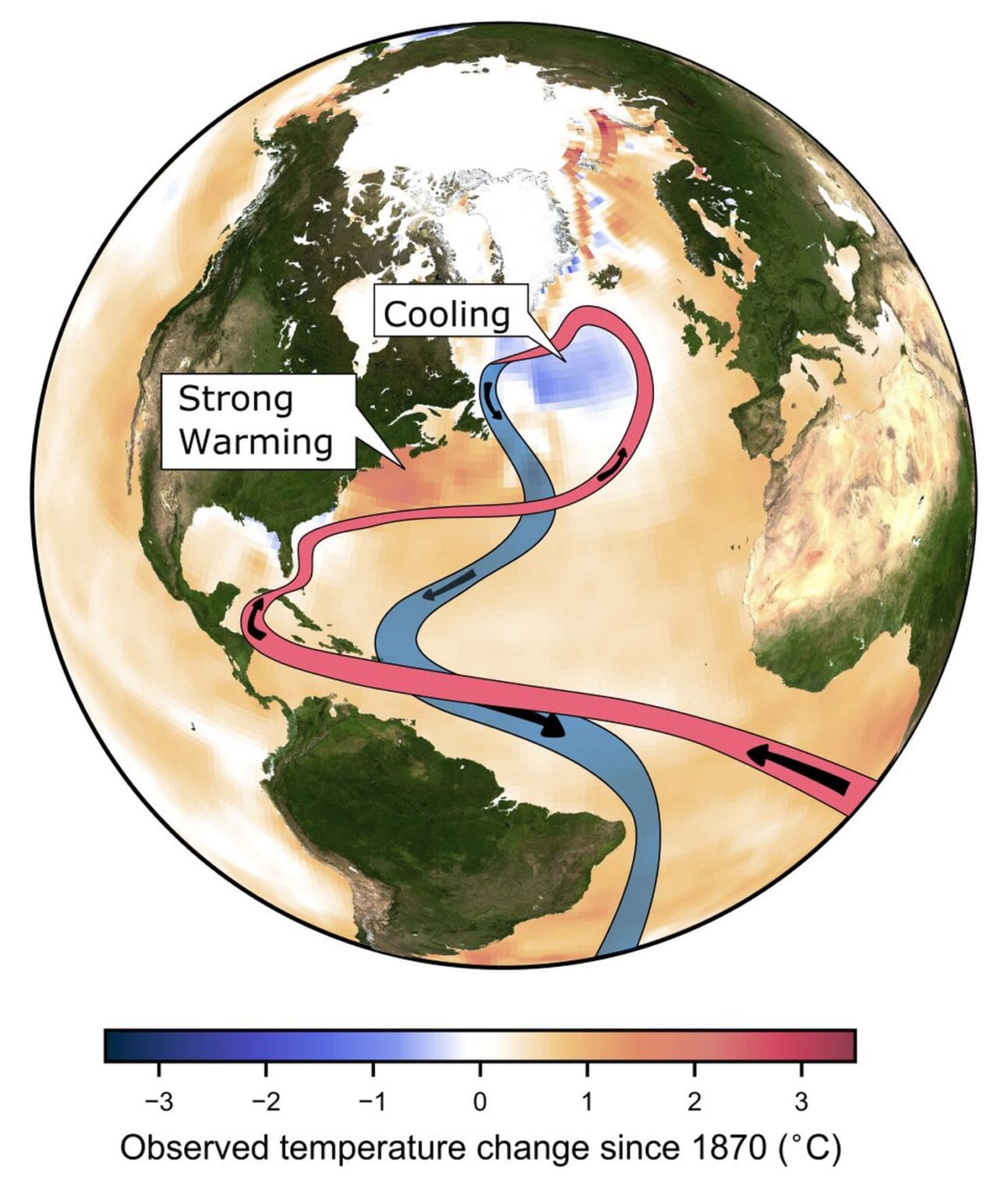ARTICLE AD
 Currents closer to the ocean's surface dancing across the Atlantic, colored according to sea surface temperature. (NASA/Goddard Space Flight Center)
Currents closer to the ocean's surface dancing across the Atlantic, colored according to sea surface temperature. (NASA/Goddard Space Flight Center)
Last year a concerning study suggested one of Earth's major ocean currents is racing towards collapse. Unfortunately, new data now backs that up.
"The temperature, sea level and precipitation changes will severely affect society, and the climate shifts are unstoppable on human time scales," the authors of the latest study warn in an article for The Conversation.
That's a terrifying prospect, and one of the most important parts of the new study is an early warning system, identified by Utrecht University oceanographer René van Westen and colleagues.
This glimpse into the future could provide the world with at least some capacity to prepare for what's to come.
"We were able to develop a physics-based and observable early warning signal involving the salinity transport at the southern boundary of the Atlantic Ocean," Van Westen and team explain.
The Atlantic Meridional Overturning Circulation (AMOC) is a large system of ocean currents that transfers warm salty water northward. This water cools on its winding journey north, which makes it denser. As the cold water sinks, water from other oceans is pulled in to fill the surface, driving the circulatory system back down south again.
AMOC has been slowing down significantly since the mid-1900s.
With increasing contributions of freshwater from melting glaciers and greater rain, concentrations of salt in the sea water drop, and the saline water becomes less dense, disrupting the sinking process and weakening the entire physical cycle.
 The AMOC circulates water vertically as well as laterally. The blue blob of cooling in the North Atlantic betrays the system's slowing. (Caesar et al., Nature 2018)
The AMOC circulates water vertically as well as laterally. The blue blob of cooling in the North Atlantic betrays the system's slowing. (Caesar et al., Nature 2018)Now, by modeling these ocean systems, van Westen and colleagues have found a way to detect when the AMOC 'tipping point' is near: the decline in salinity will slow down at the southernmost boundary of the Atlantic.
"Once a threshold is reached, the tipping point is likely to follow in one to four decades," say the authors.
AMOC has only been directly monitored since 2004, so it has not been long enough to understand the full trajectory of the current slowing trend. As a result, scientists have been using indirect indicators like salinity levels to try and fill in their knowledge gaps.
Van Westen and team have yet to amalgamate all the factors to accurately predict when the AMOC collapse will occur, but they believe that catastrophic moment is a lot closer than many current simulations suggest.
The new modeling explores the freshwater-induced tipping point itself, rather than trying to predict its timing. But the resulting data suggests AMOC is a lot more sensitive to changes than most climate models have accounted for.
"The new study confirms past concerns that climate models systematically overestimate the stability of the AMOC," Potsdam University climatologist Stefan Rahmstorf, who was not involved in the study, explained for RealClimate.
frameborder="0″ allow="accelerometer; autoplay; clipboard-write; encrypted-media; gyroscope; picture-in-picture; web-share" allowfullscreen>
AMOC impacts much of Earth's climate, so it is one of the tipping elements in Earth's climate system that researchers are most concerned about. Collapse of the AMOC happens cyclically over a million-year scale, and based on past occurrences, we know the Arctic should extend south during this time, leading to decreased temperatures in northwestern Europe by up to 15 °C, disrupting tropical monsoons and heating up the Southern Hemisphere even further.
The chain of reactions that follow will severely impact entire ecosystems and global food security.
"The new study adds significantly to the rising concern about an AMOC collapse in the not too distant future," Rahmstorf told the Associated Press. "We will ignore this at our peril."
This research was published in Science Advances.

 1 year ago
97
1 year ago
97 

